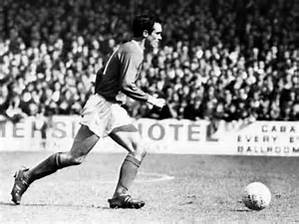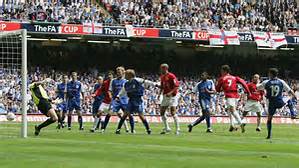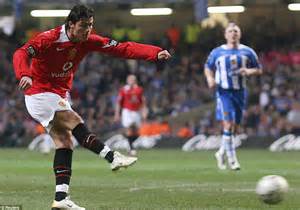From Left At The Front To Right At The Back
23/12/2016 20:18
From Left At The Front To Right At The Back
A great Manchester United tradition is the switching of the successful left, or right winger, to the left, or right, full back position. The most obviously successful players include England`s John Aston Snr, whose son, John Aston Jnr, was left winger in the European Cup Final success over Benfica, 4-1, at England`s national stadium Wembley, London, in 1968. United had won the English league championship in 1964-65 when England`s John Connelly played on the right wing, and Northern Ireland`s George Best played on the left. Though George Best was nominally the left winger, Best was so prolifically mercurial in terms of his positional play amongst the forwards, England`s John Jnr was given the left wing role for the 1965-66 season and thereafter, because then the team knew where they were if they needed to play the ball wide out to the left. John Jnr would be there waiting, whereas George might be anywhere along the forward line - and usually was! Although John Aston Jnr played on the left wing, he didn`t play at left full back regularly for Manchester United, whereas his father, John Aston Snr, was an outside left, who had made the transition to left full back for the 1948 F. A. Cup Final against Blackpool, which United won 4-2. During the 1951-2 championship winning season, future United captain, Roger Byrne, scored 7 goals in the left wing position, but by the time the 1955-56 and 1956-57 title winning seasons came around, Roger had switched to left back in place of Aston Snr, which began the modern tradition of United wingers making the transition to full back.

The plane carrying the team back from a 3-3 draw in Belgrade against Red Star, during the club`s second, and successive, campaign to win the European Cup in 1957-58, crashed in snow at Germany`s Munich airport, killing both England and United captain and left back, Roger Byrne, as well as his understudy, Geoff Bent. United`s search for a full back replacement didn`t aim to find a winger who could play full back and Irish left back, Tony Dunne, bought by manager, Matt Busby, for 5, 000 GBP from Irish side, Shelbourne, in retaining his place in the squad until 1973, meant that left wingers, even if they could have filled the left full back position, didn`t. United`s right wing, John Connelly, was subsequently replaced by Scot, Willie Morgan, who came from Burnley as Connelly had done before him, and Morgan scored the last gasp 90th minute goal that levelled the scores, 1-1, at Old Trafford, Manchester, in the Intercontinental Cup Final between the European Cup holders and the South American champions, Estudiantes de la Plata of Argentina, by virtue of their winning the Copa Libertadores against Brazil`s Palmeiras, 2-0. Estudiantes had won the away leg in Argentina, 1-0, and so took the trophy home to Buenos Aires. Willie Morgan would captain United to their only recognized trophy after `68, the 1974-5 second tier title, after relegation in 1973-4, before future England left winger, Gordon Hill, and future England right winger, Steve Coppell, arrived from Millwall and Tranmere respectively, to take United on a wing and a prayer to defeat in the 1976 F.A. Cup Final, 0-1, against Southampton, and finally victory, 2-1, in 1977 against Liverpool.

It would be some time before the tradition of wingers making the transition to full back would reappear at Manchester United, although successor to Busby`s ultimate replacement, Tommy Docherty, that is, manager Dave Sexton, achieved nothing tangible with Welshman Mickey Thomas on the left wing, rather than England`s supposedly unreliable Hill, who`d top scored in the two seasons before Sexton`s arrival, but nevertheless was sold to Derby for the alleged unreliability that had seen Docherty replace him with Irish midfield destroyer, David McCreery, in those successive F.A. Cup Finals. The new manager succeeding trophyless Sexton, was Ron Atkinson who`d win the F.A. Cup, 4-0 against Brighton in 1983, but with only a single winger, Welshman Alan Davies, on the right of the team after a career ending injury to England`s Coppell. He`d been the victim of a vicious high challenge from left full back, József Tóth, which shattered his knee during a World Cup qualifying game against Hungary in 1982. Coppell would announce his retirment in 1983 aged 28. Atkinson, however, would win the F.A. Cup Final again in 1985, 1-0 against Everton, after United were down to ten men, with center back, Kevin Moran, sent off in the 78th minute, before a curling shot on the right of the Everton area from teenage Northern Ireland forward, Norman Whiteside, found its way past the Everton `keeper`s far post in the 110th minute. In that Final Atkinson played Scot Gordon Strachan on the right, and Denmark`s Jesper Olsen on the left. Strachan was expected to be the doyen of Ferguson when he arrived as manager from Aberdeen in 1986, because Gordon had helped Aberdeen win the European Cup Winners` Cup in 1983, but although Strachan went on to Leeds and the title in 1991-2, Ferguson opted to buy Danny Wallace from Southampton, and it was he that raided down either wing in Ferguson`s earliest successes, for example, 1-0 in the 1990 F.A. Cup Final against Crystal Palace in which he played, and before left winger Lee Sharpe arrived from Torquay United in 1988 as Wallace`s rival. Sharpe made his debut prophetically at left back; in the tradition of left wingers who could play there too. Sharpe switched between left wing, and left full back, with a high degree of success during a United career that lasted until the United F.A. Cup Final and championship `double` winning season, 1995-96.

Liverpool were beaten, 1-0, in the 1996 F.A. Cup Final, thanks to an 85th minute volley from French forward, Eric Cantona, through a crowd of players in the Liverpool area. In the league Newcastle United were overcome by 82 points to 78, and Lee Sharpe started 21 times while making 10 substitute appearances for 4 goals during the successful title campaign. Lee was an unused substitute in the F.A. Cup Final but qualified for a medal. It was United`s second double winning season after 1993-94. That season Sharpe made 26 starts and 4 as substitute, scoring 9 goals as United won the title with 92 points over Blackburn Rovers` 84, while the F.A. Cup Final was duly won, 4-0, against Chelsea, and Sharpe came on as an 84th minute substitute, which means he`s among the few players to win the `double` twice. Although it now seems unbelievable, Lee Sharpe`s 27 starts for 1 goal in the season 1992-93 helped to give United their first title in 26 years after the 1966-67 title win that qualified the club to participate in the European Cup that they finally won for the first time in 1968. Consequently, left wing and left full back, Lee Sharpe, is an unsung hero of United`s of immense stature. Coming on in the 75th minute as a substitute, Lee qualified for a medal in the 1992 League Cup Final win over Nottingham Forest, 1-0, which was then United`s only success in a competition that had begun in 1960. With 3 league championship winners` medals, 2 F.A. Cup winners` medals, and a League Cup winners` medal, Lee Sharpe is among the most decorated players ever to inject the thrust needed from either the wing or full back position to take United`s powerful engine forward.

The days of Beckham and Giggs are legendary. With Ryan Giggs on the left wing, and David Beckham on the right, United made their second appearance in the European Cup Final at Barcelona`s Nou Camp stadium in 1999, when they came back from an early 6th minute goal from a direct free kick by right winger, Mario Basler, to win the trophy in extra time against Germany`s Bayern Munich, 2-1. A 91st minute goal poached inside the penalty area by England`s Teddy Sheringham was followed by a similar 93rd minute strike from Norway`s Ole Gunnar Solskjaer. The performances of Beckham and Giggs on the wings meant that, even if wingers emerged at United during their period of pre-eminence, a full back berth was all their aspiration. Beckham, captain of England, left United for Real Madrid at the beginning of the 2003-4 season with 6 championship wins, 1995-6, 1996-7, 1998-9, 1999-2000, 2000-1, and 2002-3; and 2 F.A. Cup wins, 1996, and 1999 as a part of the illustrious treble of league title, European Cup and F.A. Cup; as well as a win in the Intercontinental Cup Final against Brazil`s Palmeiras, 1-0, thanks to a 35th minute run and tap in at the far post by midfielder, Roy Keane, from a Ryan Giggs` left wing cross. Portugal`s Cristiano Ronaldo was bought from Sporting CP for 12. 24 million GBP, and was a more than adequate replacement for Beckham before the lure of Real Madrid took him away too at the beginning of the 2009-10 season. Ronaldo was no right back, and after his first success with United in the 2004 F.A. Cup Final against Millwall, 3-0, in which he headed the first goal in the 41st minute, came the League Cup in 2006 against Wigan, 4-0, with Cristiano getting the third in the 59th minute. Cristiano would amass a plentiful haul of silverware; titles in 2006-7, 2007-8, and the European Cup in 2008 followed by the World Club Cup. The league and League Cup `double` was won in 2009 with Ronaldo scoring in the League Cup Final penalty shoot out, 4-1, after the game against Tottenham Hotspur had finished, 0-0, so replacing the Portuguese right wing was a Herculean task for Ferguson.

Ryan Giggs remained with United until he was over 40 years of age, and indeed helped the club to win the league in 2012-13, with 22 appearances for 2 goals, after his debut in 1991, before finally retiring in the 2013-14 season with 12 appearances that would have qualified him for a title winners` medal if the team had won. Giggs` medal haul was 13 titles; 1992-3, 1993-4, 1995-6, 1996-7, 1998-9, 1999-2000, 2000-1, 2002-3, 2006-7, 2007-8, 2008-9, 2010-11, 2012-13; 4 F.A. Cups, 1993-4, 1995-6, 1998-9, 2003-4; 4 League Cups, 1991-2, 2005-6, 2008-9, 2009-10, and in terms of world football, those 2 European Cups; 1999, and 2008 in which Giggs scored the winning goal in the penalty shoot out that beat Chelsea, 6-5, when the scores had been 1-1 after a 45th minute goal from Chelsea midfielder, Frank Lampard, cancelled United`s Portuguese right winger Cristiano Ronaldo`s header from a left footed cross on the right wing by right full back, Wes Brown, in the 26th minute. Giggs had begun winning world trophies early in his career with the European Super Cup of 1991 against Red Star, 1-0, effectively celebrating Alex Ferguson`s United`s first European trophy, the European Cup Winners` Cup of 1991, when they beat Barcelona, 2-1, with both goals from fellow Welsh striker, Mark Hughes, and after a successful F.A. Cup winning campaign in 1990 that was resolved after left full back, Lee Martin, ran the length of the Wembley pitch to crash the ball past the Crystal Palace `keeper in the 59th minute, 1-0. For the 2008 World Club Cup win, Giggs remained on the bench as an unused substitute who nevertheless qualified for a WCC winners medal. Watching center forward, Wayne Rooney, score the 73rd minute goal from where he was lurking on the edge of Liga Deportiva Universitaria de Quito`s area, where he was conserving energy to cover ground for the team, after Serbian center back, Nemanja Vidic, had been sent off in the 49th minute, United`s 1-0 victory over LDU Quito completed the Welsh left winger`s haul of titles outside England and of global renown.

Like his predecessor before him, Sir Matt Busby, Sir Alex Ferguson was made a knight of the realm by Queen Elizabeth II, and it was to Ecuador that Ferguson looked for a right winger subsequent to United`s victory in the World Club Cup Final over South America`s champions, Ecuador`s LDU Quito, by virtue of their winning the Copa Libertadores against Fluminense, 3-1 away on penalties, and after the two legs had produced a 5-5 draw, 1-3 away, and 4-2 at home, which qualified the Ecuadorians for the semi-finals of the World Club Cup against Mexico`s Pachua, which they won, 2-0, before losing the Final, 1-0, to Manchester United. Encouraged by what he`d seen of Ecuadorian soccer, Antonio Valencia was the right winger that Sir Alex Ferguson brought from Wigan for about 16 million GBP for the 2009-10 season. Ferguson would retire in 2013 with his 13th title as United manager, but Valencia would still be there after Everton`s Scot, David Moyes, and Holland`s Dutch team manager, Louis Van Gaal, when Jose Mourinho took over the managerial duties for the 2016-17 season. Beginning as a right winger, Valencia`s highest goal tally was 5 in 2009-10, and he played on the right wing from the start in United`s 2-1 League Cup Final win over Aston Villa. Although making only eight starts in 2010-11 with two substitute appearances, Valencia qualified for a league winners medal as United topped the table with 80 points from Chelsea`s 71. In Ferguson`s final season in charge, Antonio made 24 starts and six substitute appearances as United took the title with 89 points to Manchester City`s 78. Used more effectively as a right full back by successive managers after Ferguson`s retirement, in the tradition of wingers switched to full back, Antonio Valencia triumphed again in 2015-16 when United came from behind to beat Crystal Palace in the F.A. Cup Final, 2-1, with an 81st minute goal from Spain`s right midfielder, Juan Mata, cancelling out a 78th minute strike from English substitute midfielder, Jason Puncheon, who had come on in the 72nd minute, before England`s left winger, and 90th minute substitute, Jessie Lingard, volleyed home from outside the Palace `keeper`s area in the 111th minute. A trophy haul of 2 league championships, the League Cup, and the F.A. Cup meant that Valencia`s name would at least be ranked among the wingers who were switched to full back with great success at Manchester United.
